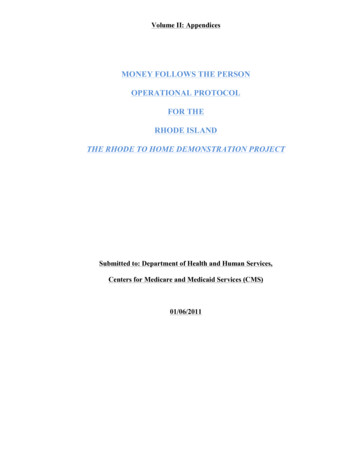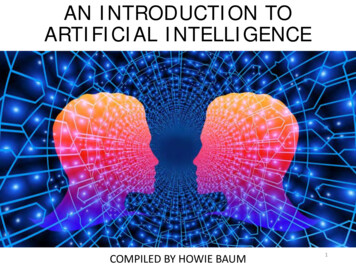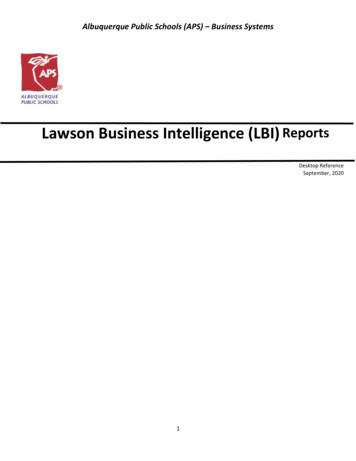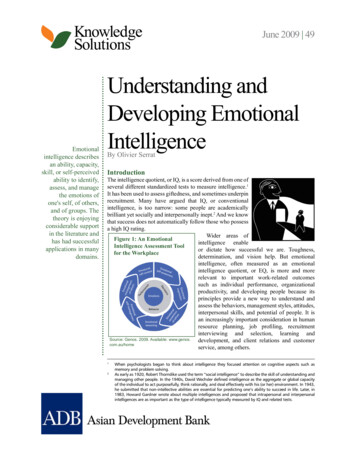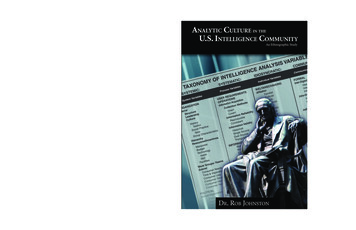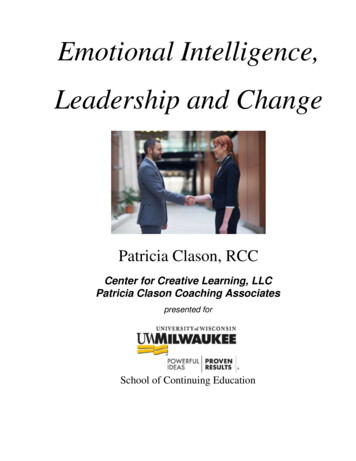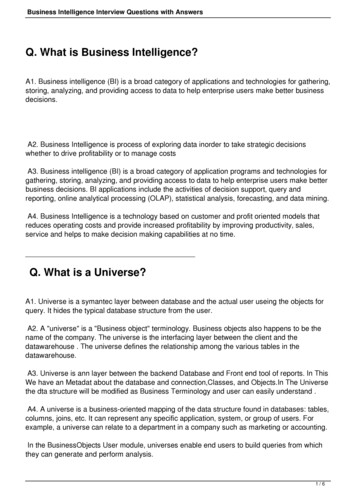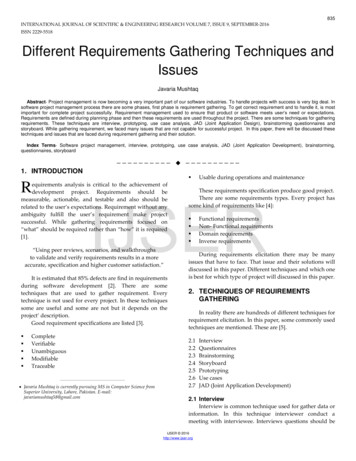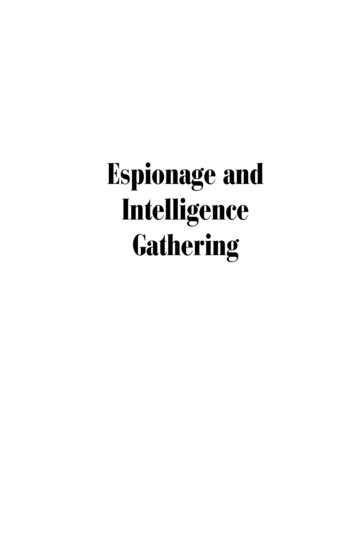
Transcription
Espionage andIntelligenceGathering
Other books in the Current Controversies series:The Abortion ControversyAlcoholismAssisted SuicideBiodiversityCapital PunishmentCensorshipChild AbuseCivil LibertiesComputers and SocietyConserving the EnvironmentCrimeDeveloping NationsThe DisabledDrug AbuseDrug LegalizationDrug TraffickingEthicsFamily ViolenceFree SpeechGarbage and WasteGay RightsGenetic EngineeringGuns and ViolenceHate CrimesHomosexualityIllegal DrugsIllegal ImmigrationThe Information AgeInterventionismIssues in AdoptionMarriage and DivorceMedical EthicsMental HealthThe Middle EastMinoritiesNationalism and EthnicConflictNative American RightsPolice BrutalityPoliticians and EthicsPollutionPrisonsRacismThe Rights of AnimalsSexual HarassmentSexually Transmitted DiseasesSmokingSuicideTeen AddictionTeen Pregnancy and ParentingTeens and AlcoholThe Terrorist Attack onAmericaUrban TerrorismViolence Against WomenViolence in the MediaWomen in the MilitaryYouth Violence
Espionage andIntelligenceGatheringLouise I. Gerdes, Book EditorDaniel Leone, PresidentBonnie Szumski, PublisherScott Barbour, Managing EditorHelen Cothran, Senior EditorCURRENT CONTROVERSIESSan Diego Detroit New York San Francisco ClevelandNew Haven, Conn. Waterville, Maine London Munich
2004 by Greenhaven Press. Greenhaven Press is an imprint of The Gale Group, Inc.,a division of Thomson Learning, Inc.Greenhaven and Thomson Learning are trademarks used herein under license.For more information, contactGreenhaven Press27500 Drake Rd.Farmington Hills, MI 48331-3535Or you can visit our Internet site at http://www.gale.comALL RIGHTS RESERVED.No part of this work covered by the copyright hereon may be reproduced or used in any formor by any means—graphic, electronic, or mechanical, including photocopying, recording,taping, Web distribution or information storage retrieval systems—without the writtenpermission of the publisher.Every effort has been made to trace the owners of copyrighted material.Cover credit: Roger Ressmeyer/CORBISLIBRARY OF CONGRESS CATALOGING-IN-PUBLICATION DATAEspionage and intelligence gathering / Louise I. Gerdes, book editor.p. cm. — (Current controversies)Includes bibliographical references and index.ISBN 0-7377-1582-0 (pbk. : alk. paper) — ISBN 0-7377-1581-2 (lib. : alk. paper)1. Intelligence service—United States. 2. Espionage—United States.3. Espionage, American. I. Gerdes, Louise I. II. Series.JK468.I6E73 2004327.1273—dc212003049017Printed in the United States of America
ContentsForeword11Introduction13Chapter 1: Are Espionage and Intelligence-GatheringActivities Justified?Chapter Preface18Yes: Espionage and Intelligence-Gathering ActivitiesAre JustifiedCIA Espionage and Intelligence-Gathering Activities Are Justifiedby Ernest W. Lefever20When conducted for the greater good, CIA activities such as backingcoups that depose brutal tyrants are justified. Although these activitiessometimes raise ethical questions, they are necessary to protect nationalsecurity and guarantee freedom worldwide.Brutal Interrogation Techniques May Be Necessary to Gather ValuableIntelligence by Bruce Hoffman25History has proven that obtaining vital information from terrorists oftenrequires brutal interrogation techniques. Although some consider torturemorally reprehensible, its use can help save the lives of innocent people.No: Espionage and Intelligence-Gathering Activities AreNot JustifiedCovert Operations Are Corrupt and Immoral by Ramsey Clark33A history of corrupt, government-supported massacres and assassinationsreveals that covert operations are immoral and unnecessary. Americansshould demand that leaders state openly how they plan to act against thenation’s enemies.Using Drug Money to Finance CIA Activities Is Wrongby Alain LabrousseAlthough the United States claims to be the world’s leader in the war ondrugs, the CIA uses drug money to finance its operations abroad. In consequence, drug addiction worldwide is, in part, a result of CIA drugtrafficking.38
Polygraph Testing to Prevent Espionage at Nuclear Weapons LabsUndermines Security by Alan P. Zelicoff43Polygraph machines cannot detect lies and will not catch spies at America’s nuclear weapons labs. In fact, polygraph testing undermines nationalsecurity by demoralizing loyal scientists and creating a false sense ofsecurity.Espionage Tactics That Misinform the American Public Are Corrosiveby Ted Gup47Espionage tactics that conceal or withhold information in the name ofnational security are unnecessary and show disrespect for the Americanpeople. Moreover, government secrets can too easily lead to lies and arecontrary to American principles.Chapter 2: Should the United States Reform ItsEspionage and Intelligence-Gathering Methods?Intelligence Reforms: An Overview by Brian Hansen51U.S. intelligence agencies failed to predict the terrorist attacks of September 11, 2001, stimulating debate over their effectiveness. While someclaim that reorganization, internal reforms, and new policies will improveintelligence gathering, others argue that traditional strategies remaineffective.Yes: The United States Should Reform Its Espionage andIntelligence-Gathering MethodsThe United States Should Reform Its Intelligence-Gathering Methodsby John M. Deutch and Jeffrey H. Smith62Cooperation among domestic and foreign intelligence-gathering agenciesmust be improved. A more centralized intelligence community would bemore successful in gathering and analyzing information pertaining to terrorist activity.The FBI Must Improve Its Counterespionage Strategiesby Patrick Leahy69The unmasking of a spy within the FBI exposed severe internal securityproblems. To protect sensitive information, the FBI must train its employees in document security practices, implement new safeguards, andenforce “need to know” rules.Improved Surveillance and Information Sharing Is Necessary to ProtectAmerica Against Terrorists by Michael Scardaville74Preventing terrorist attacks will require better information sharingbetween the FBI and other federal agencies. Moreover, the developmentof a health surveillance network will be necessary to quickly identifyindividuals who have grown sick as a result of a biological attack.U.S. Intelligence Agencies Must Curb Their Reliance on SurveillanceTechnology by Kevin Hogan80
U.S. intelligence agencies have the technology to amass mountains ofinformation, but turning that data into useful intelligence can be difficult.Despite spending billions on sophisticated spyware, U.S. intelligenceagencies still cannot predict terrorist attacks.The U.S. Intelligence Community Must Develop More HumanIntelligence to Combat Terrorism by Jamie Lowther-Pinkerton87Air assaults and sophisticated ground raids are unsuitable for the war onterrorism. Useful intelligence comes not from sophisticated technologybut from human beings familiar with the cultural and physical terrain terrorists inhabit.No: The United States Should Not Reform Its Espionage andIntelligence-Gathering MethodsCIA Intelligence-Gathering Methods Have Been Successful in FightingTerrorism by James L. Pavitt90Although the CIA cannot prevent all acts of terrorism, it has successfullyfoiled many terrorist plots. Reforms are unnecessary because the CIAeffectively uses all of the intelligence-gathering methods allowed by lawto protect the nation.Counterespionage Reforms at U.S. Intelligence Agencies AreUnnecessary by Jay Taylor98Counterespionage reforms based on exaggerated fears of moles infiltrating U.S. intelligence agencies will undermine important intelligencework. Existing security measures developed during the Cold War are sufficient to protect against internal spies.The CIA Should Not Become Involved in Direct Combat Operationsby Bruce Berkowitz100The CIA should leave fighting to America’s soldiers and stick to what itdoes best—spying. Helping conduct direct military actions as it did inAfghanistan after the September 11, 2001, terrorist attacks will only jeopardize the agency’s ability to conduct covert operations.Tighter Controls to Prevent Espionage at U.S. Research LaboratoriesAre Harmful by Neal Lane106Controls designed to increase security at U.S. research laboratories discourage international cooperation and impede scientific and technologicalprogress in the United States. These measures discourage foreign scientists from working at U.S. labs, isolating American scientists from theinternational scientific community.Creating a Defense Department Intelligence Czar Could BiasIntelligence Gathering by Jason VestCreating an under secretariat for intelligence at the Pentagon could biasintelligence analysis in favor of those who advocate war. Moreover, thePentagon might conduct unpopular covert operations if the intelligenceczar’s decisions are not subject to congressional oversight.109
Chapter 3: Do Espionage and Intelligence-GatheringActivities Violate Civil Liberties?Chapter Preface114Yes: Espionage and Intelligence-Gathering Activities ViolateCivil LibertiesGranting Intelligence Agencies Increased Powers to Fight TerrorismThreatens Civil Liberties by Philip B. Heymann116Laws granting U.S. law enforcement and intelligence agencies new powers to prevent and punish acts of terrorism threaten civil liberties. Monitoring communications violates privacy, detaining members of particularethnic groups is discriminatory, and punishing suspected terrorists in military courts denies them a fair trial.The Total Information Awareness System Violates Privacy Rightsby John Allen Paulos123The Total Information Awareness (TIA) system, a centralized databasecataloging personal data on Americans, will successfully identify somepotential terrorists. However, TIA will also identify as terrorists millionsof innocent Americans.Secret Review Courts Foster Violations of Civil Libertiesby Charles Levendosky126Secret courts granting broader authority for federal searches and seizuresseriously threaten civil liberties. Fourth Amendment rights prohibitingsurveillance without cause and requiring that warrants be issued by a neutral judge should not be sacrificed for greater national security.Expanding FBI Intelligence-Gathering Powers Will Violate CivilLiberties by Nat Hentoff129Increasing the intelligence-gathering authority of the FBI signals a returnto a time when the FBI routinely violated civil liberties. The FBI hasagain been given broad authority to collect information on Americans,even if they are doing nothing illegal.Intelligence Gathering to Prevent Economic Espionage Violates CivilLiberties by Andrew Grosso132The Economic Espionage Act, which prohibits the theft of “tradesecrets,” restricts civil liberties. The act allows federal law enforcementofficers to use wiretaps—one of the most intrusive of all investigativetechniques—to investigate violations of the act and prohibits thoseaccused of economic espionage a fair trial.No: Espionage and Intelligence-Gathering Activities Do NotViolate Civil LibertiesGranting Intelligence Agencies Increased Powers to Fight TerrorismDoes Not Threaten Civil Liberties by Viet D. DinhPeople cannot have liberty without order. To protect America from terror-137
ists who threaten the principle of ordered liberty, some restrictions oncivil liberties—such as monitoring digital communications and detainingsuspected terrorists—are essential.The Total Information Awareness System Does Not Violate PrivacyRights by Jeff Carley143To protect against terrorists, government and law enforcement agenciesneed the Total Information Awareness (TIA) system, a database containing personal data on Americans. Contrary to critics’ charges that TIA willviolate civil liberties, the system has sufficient safeguards in place to protect Americans’ privacy.Secret Review Courts Do Not Foster Violations of Civil Libertiesby Stuart Taylor Jr.147Using special review courts to grant broad authority for federal searchesand seizures does not threaten civil liberties. Allowing such activities toaid in criminal prosecutions will help dismantle the “wall” keeping intelligence and law enforcement officials from working with one another tofight terrorism.Chapter 4: What Challenges Will the Espionageand Intelligence-Gathering Community Face in theTwenty-First Century?Chapter Preface152The Changing Nature of Warfare Requires New Intelligence-GatheringTechniques by G.I. Wilson, John P. Sullivan, and Hal Kempfer154No longer will nation-states be the principle actors in global conflicts;rather, terrorist groups, organized crime lords, tribal chieftains, and insurgents will conduct modern wars. If America is to protect itself in this newglobal environment, the nation’s intelligence agencies must make betteruse of information technologies.Emerging Terrorist Threats Require New Spying Strategiesby Gregory F. Treverton161The CIA must begin working with America’s enemies, who, being closerto terrorist organizations, will be more likely to help the United Statesprevent future terrorist attacks.U.S. Counterintelligence Methods Must Be Improvedby Richard Shelby164American intelligence agencies have failed to detect spies in their midst.To prevent the damage these spies can cause to the nation’s security, theintelligence community must create new strategies to protect America’ssecrets.Digital Spies Pose a Serious Threat to National Securityby Barry NeildThe digital spy has replaced the cloak-and-dagger spy. Instead of conducting secret face-to-face meetings in railway stations, today’s spies173
crack computer codes in order to access highly sensitive commercialinformation and could possibly disrupt the essential functions of largecities.Globalization Is Making It Easier for Foreign-Born Citizens to Spyon the United States by Bill Gertz176Globalization has brought more foreigners—who often turn out to betraitors—to the United States, and technological advances have made iteasier for these spies to gain access to sensitive information.Organizations to ContactBibliographyIndex179183186
ForewordBy definition, controversies are “discussions of questions in which opposingopinions clash” (Webster’s Twentieth Century Dictionary Unabridged). Fewwould deny that controversies are a pervasive part of the human condition andexist on virtually every level of human enterprise. Controversies transpire between individuals and among groups, within nations and between nations. Controversies supply the grist necessary for progress by providing challenges andchallengers to the status quo. They also create atmospheres where strife andwarfare can flourish. A world without controversies would be a peaceful world;but it also would be, by and large, static and prosaic.The Series’ PurposeThe purpose of the Current Controversies series is to explore many of the social, political, and economic controversies dominating the national and international scenes today. Titles selected for inclusion in the series are highly focusedand specific. For example, from the larger category of criminal justice, CurrentControversies deals with specific topics such as police brutality, gun control,white collar crime, and others. The debates in Current Controversies also arepresented in a useful, timeless fashion. Articles and book excerpts included ineach title are selected if they contribute valuable, long-range ideas to the overalldebate. And wherever possible, current information is enhanced with historicaldocuments and other relevant materials. Thus, while individual titles are currentin focus, every effort is made to ensure that they will not become quickly outdated. Books in the Current Controversies series will remain important resources for librarians, teachers, and students for many years.In addition to keeping the titles focused and specific, great care is taken in theeditorial format of each book in the series. Book introductions and chapter prefaces are offered to provide background material for readers. Chapters are organized around several key questions that are answered with diverse opinions representing all points on the political spectrum. Materials in each chapter includeopinions in which authors clearly disagree as well as alternative opinions inwhich authors may agree on a broader issue but disagree on the possible solutions. In this way, the content of each volume in Current Controversies mirrorsthe mosaic of opinions encountered in society. Readers will quickly realize thatthere are many viable answers to these complex issues. By questioning each au-11
Espionage and Intelligence Gatheringthor’s conclusions, students and casual readers can begin to develop the criticalthinking skills so important to evaluating opinionated material.Current Controversies is also ideal for controlled research. Each anthology inthe series is composed of primary sources taken from a wide gamut of informational categories including periodicals, newspapers, books, United States andforeign government documents, and the publications of private and public organizations. Readers will find factual support for reports, debates, and research papers covering all areas of important issues. In addition, an annotated table ofcontents, an index, a book and periodical bibliography, and a list of organizations to contact are included in each book to expedite further research.Perhaps more than ever before in history, people are confronted with diverseand contradictory information. During the Persian Gulf War, for example, thepublic was not only treated to minute-to-minute coverage of the war, it was alsoinundated with critiques of the coverage and countless analyses of the factorsmotivating U.S. involvement. Being able to sort through the plethora of opinionsaccompanying today’s major issues, and to draw one’s own conclusions, can bea complicated and frustrating struggle. It is the editors’ hope that Current Controversies will help readers with this struggle.Greenhaven Press anthologies primarily consist of previously publishedmaterial taken from a variety of sources, including periodicals, books, scholarlyjournals, newspapers, government documents, and position papers from privateand public organizations. These original sources are often edited for length andto ensure their accessibility for a young adult audience. The anthology editorsalso change the original titles of these works in order to clearly present themain thesis of each viewpoint and to explicitly indicate the opinion presented inthe viewpoint. These alterations are made in consideration of both the readingand comprehension levels of a young adult audience. Every effort is made toensure that Greenhaven Press accurately reflects the original intent of theauthors included in this anthology.12
“Despite [an] expansive intelligence-gathering system, America hasnot been invulnerable to attack. Perhaps the best example of theintelligence community’s failure to protect Americans is theSeptember 11, 2001, terrorists attacks.”IntroductionFrom its inception, the United States has engaged in espionage andintelligence-gathering activities in order to defend against its enemies. Intelligence gathering was initially a function of the Department of Defense, whichhas several agencies under its umbrella: the Defense Intelligence Agency, theintelligence agencies of each arm of the military, the highly secret National Security Agency, the National Reconnaissance Office, and the National Imageryand Mapping Agency. Over the years other executive departments have alsocreated intelligence divisions. The Department of Energy, for example, has anintelligence arm to protect nuclear secrets. The Department of State and the Department of the Treasury also conduct intelligence to safeguard national interests under their protection.Probably the most well known of the departmental intelligence agencies is theFBI, which is part of the Department of Justice. The FBI was initially a law enforcement agency. Prior to World War II, the Bureau had been winning widepublic support for its highly publicized capture of gangsters. With the outbreakof war in Europe in 1939, however, the FBI began to focus more on the investigation of subversion, sabotage, and espionage. After World War II PresidentsHarry S. Truman and Dwight D. Eisenhower granted the FBI the authority toconduct background investigations on present and prospective government employees. Many suspected and convicted spies, such as Julius and Ethel Rosenberg, had been federal employees, and FBI background investigations wereconsidered to be vital in cracking major espionage cases. In 1982, following anexplosion of terrorist incidents worldwide, FBI Director William Webster madecounterterrorism an FBI priority.Tracking terrorists has always been a priority of the CIA, whose function is tocollect and analyze foreign intelligence and distribute it to government officialsand other intelligence agencies. The CIA also conducts covert operations tospur changes abroad advantageous to the United States—such as supportingcoups to depose uncooperative leaders—while disguising America’s role in theaction. Although the United States has long been involved in these activities,the CIA itself, as it is presently known, was not established until after WorldWar II came to an end. The agency’s origins can be traced directly to that war.13
Espionage and Intelligence GatheringAs the United States edged closer to entering the war in Europe, PresidentFranklin D. Roosevelt felt the need for a civilian intelligence agency devoted tonational security. In July 1941 he created the office of Coordinator of Information (COI). The agency’s primary directive was to monitor the activities ofAdolf Hitler. However, only five months later Japan led a surprise attack onPearl Harbor on December 7, 1941, and the United States declared war againstJapan. Since the United States was at war in Europe and in the Pacific, in June1942 Roosevelt replaced the COI with a more diversified intelligence agency,the Office of Strategic Services (OSS). The OSS developed into a worldwideclandestine service that provided valuable intelligence on enemy targets and directed and analyzed Allied bombing raids. After the war William J. Donovan,head of the OSS, recommended that a civilian-run organization be created tocoordinate information gathered by the various military and non-military intelligence communities, and President Harry S. Truman signed the National Security Act of 1947, which established today’s CIA. The head of the CIA, the Director of Central Intelligence, also supervises the FBI and the other twelveintelligence agencies that make up the U.S. intelligence community.Despite this expansive intelligence-gathering system, America has not beeninvulnerable to attack. Perhaps the best example of the intelligence community’s failure to protect Americans is the September 11, 2001, terrorists attacks.On the morning of September 11, nineteen terrorists crashed two planes into thetwin towers of the World Trade Center in New York, a third into the Pentagon inWashington, D.C., and a fourth, its actual target unknown, into a rural Pennsylvania field. These attacks killed more than three thousand people. The terroristsresponsible for the attacks were believed to be part of al-Qaeda, a network ofterrorists under the direction of exiled Saudi millionaire Osama bin Laden. Almost immediately after this tragedy, people began to ask why the nation’s vastintelligence community—which had long been monitoring al-Qaeda—failed toprevent the attacks.Some analysts argue that centralized decision-making at the FBl prevented thebureau from acting on valuable intelligence that could have prevented the attacks. These commentators cite the experiences of FBI agents Ken Williams andColeen Rowley. In July 2001 agent Williams wrote a memo in which he expressed concern that Osama bin Laden might be sending terrorists to train atU.S. flight schools. Williams recommended canvassing flight schools for peoplewho might be on terrorist watch lists. Although some maintain that William’smemorandum essentially predicted the terrorist attacks, FBI headquarters didnot act on it. Coleen Rowley revealed that FBI management obstructed the investigation of terrorist suspect Zacarias Moussaoui, who some believe was alsoinvolved in the attacks. Rowley and her colleagues were denied permission tosearch his laptop computer and personal items to uncover evidence of terrorismor terrorist plots.This centralized decision-making was the result of structural changes made14
Introductionwithin the FBI in the 1970s in response to criticism about the agency’s assaultson civil liberties. FBI documents leaked to the press at that time revealed thatthe bureau’s counterintelligence program, COINTELPRO, had been illegallyspying on civil rights, antiwar, and student leaders in a campaign intended todestroy their credibility. In 1976 President Gerald Ford created a commission toinvestigate intelligence agency abuses and suggest reforms. The Church Commission, led by Senators Frank Church and Otis G. Pike, recommended a morecentralized FBI. After implementing the committee’s recommendations, theFBI required that agents seek permission from headquarters to pursue investigation of subversives or terrorists. Field agents no longer had the power to begininvestigations without evidence that a specific crime had been committed orwas going to be committed, and if agents had evidence, they had to wait weeksor months for express approval from headquarters before proceeding. Some analysts claim that these restrictions explain why the FBI failed to utilize the information it had on al-Qaeda to prevent the September 11 terrorist attacks.Restrictions imposed by President Jimmy Carter also made it difficult for theCIA to gain valuable intelligence on the al-Qaeda terrorists, some claim. During his administration, Carter ordered reforms that called for CIA field officersto obtain approval before recruiting informants with criminal or human rightsabuse records. Some experts claim that these restrictions hindered the CIA fromobtaining intelligence that could have helped operatives anticipate the terroristattacks. “These rules make absolutely no sense with respect to terrorist groupsbecause the only people in terrorist groups are people who want to be terrorists,” says former CIA director James R. Woolsey. “That means they have abackground in violence and human-rights violations.”Other commentators claim that walls between the various intelligence agencies prevented them from sharing important information. According to Dana R.Dillon of the Heritage Foundation, “America’s foreign and domestic agencieseither do not or cannot share intelligence resources.” Jurisdictional obstacles,she argues, discourage sharing. The FBI, as a law enforcement agency, gathersintelligence in order to present it as evidence in court, so it must protect the information to preserve the rights of the accused. The foreign intelligence community, including the CIA, protects its intelligence because it does not want tocompromise information or endanger the lives of the informants and agentswho provide it. As a result, says Dillon, “a breakdown occurred at the level ofinteragency communication, allowing two hijackers to board commercialplanes despite being on the Central Intelligence Agency’s watch list.”Other analysts maintain that fundamental cultural differences have long hindered cooperation between the CIA and FBI. The CIA was established to collect intelligence abroad, and its charter forbids it to conduct investigations inside the United States. Instead, it passes on intelligence relevant to domesticconcerns to the FBI, which handles domestic investigations. These analysts assert that the United States often fails to anticipate cross-border threats like ter-15
Espionage and Intelligence Gatheringrorism because it lacks a single agency devoted to collecting, analyzing, andpiecing together both domestic and foreign information.Still others argue that restrictions on surveillance prevent intelligence agencies from obtaining essential information on terrorist activities. The Foreign Intelligence Surveillance Court (FICA) is a secretive panel of federal judges thatconsiders requests from the U.S. Intelligence community to spy on foreign nationals and citizens suspected of being spies or having ties to overseas terroristgroups. To install a wiretap on a suspected terrorist’s phone, agents must proveto the court that the individual is an “agent of a foreign power.” Some agents interviewed by Greg Krikorian of the Los Angeles Times maintain that this requirement “often proved impossible, either because a suspect could not belinked to a specific hostile country or because the ability to make that connection hinged on court-ordered surveillance.” Although this standard is less thanthat required in America’s criminal courts, which requires a showing of probable cause that a crime is being committed, agents complained that “they facedmore restrictions pursuing international terrorists than they did on teenagestreet gang members.”In order to address these issues and protect Americans from future terrorist attacks, several reforms of America’s intelligence community have been proposed, although many have yet to be implemented. The USA Patriot Act, whichwent into effect on October 26, 2001, makes it easier for intelligence agenciesto obtain search and surveillance warrants. In May 2002 Attorney General JohnAshcroft revised the FBI’s investigative guidelines to allow field offices to opencriminal investigations without first obtaining approval from headquarters. Inthe spring of 2002, FBI Director Robert Mueller announced plans to create anoffice of intelligence to gather, analyze, and share critical national security information with other agencies; he also proposed a national joint terrorism taskforce to help the FBI coordinate its efforts with the CIA and other agencies.Wh
Espionage and Intelligence Gathering Louise I. Gerdes, Book Editor Daniel Leone,President Bonnie Szumski, Publisher Scott Barbour, Managing Editor Helen Cothran, Senior Editor CURRENT CONTROVERSIES S
